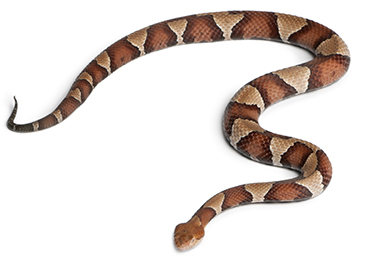Maryland Poison Center Shows It's the Season for Snakes
Snakebite season is upon us, and the Maryland Poison Center (MPC) seeks to educate the public on best practices in snakebite prevention and first aid in response to numerous snakebite reports.
By: Whitney Pennington
Friday, July 28, 2017

In 2016, the Maryland Poison Center managed 74 bites from venomous and non-venomous snakes. So far in 2017, the MPC has managed 52 snakebite cases, the majority of them occurring since June 1. Notably, there have been 28 reports of copperhead snakebites.
“Because every snakebite is different, the poison specialists at the Maryland Poison Center will advise patients on the type of care best for their situation,” says Bruce Anderson, PharmD, DBAT, executive director of the MPC.
“For example, not all venomous snakebites will require treatment with antivenom. Making the Maryland Poison Center your first call helps you get the right care, right away,” adds Anderson.
If you are bitten, the Maryland Poison Center recommends the following:
- Do not panic; keep still and calm. Fewer than 10 people die of snakebites each year in the United States.
- Call the Maryland Poison Center immediately at 1-800-222-1222. If the person who was bitten is having trouble breathing or losing consciousness, call 911 immediately.
- Remove all jewelry and tight clothing.
- Wash the bite with soap and water and cover the bite with a clean, dry dressing, if available, and if doing so does not cause delay in treatment.
- Try to remember the color and shape of the snake, but don’t move closer to it. Only take a photograph of the snake if you can do so from a safe distance. You do not need to bring the snake with you in order to get the proper medical treatment.
- Note the time the bite happened.
There are many myths about the appropriate first aid treatments for snakebites. DO NOT do any of the following:
- Do not apply a tourniquet or attempt to restrict blood flow to the affected area.
- Do not cut the wound.
- Do not attempt to suck out the venom.
- Do not apply heat or ice.
Snakes are a beneficial component of Maryland's natural habitat, but because they are common throughout the state, there are times when a surprise encounter can lead to person being bitten. To reduce this risk, the Maryland Department of Natural Resources recommends you always keep aware of your surroundings when enjoying nature, and always refrain from handling or approaching wildlife.
Follow these tips to avoid being bitten by a snake:
- Leave snakes alone. Do not try to get a closer look or try to pick up a snake.
- Wear gloves when gardening. Move plants and weeds with a gardening tool before reaching your hand into a place that you cannot see.
- Stay out of tall grass and remain on hiking paths. Use a walking stick to move grass and brush that you cannot see through if not hiking on a path.
- Always hike with a friend.
For additional information on prevention and first aid for snakebites, visit mdpoison.com. For more information on the snakes native to Maryland, visit the Maryland Department of Natural Resources’ Field Guide to Maryland’s Snakes.